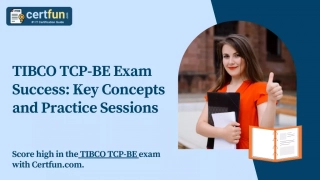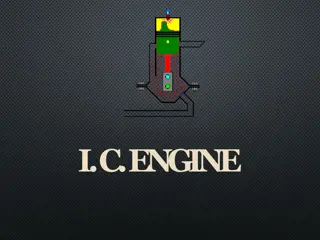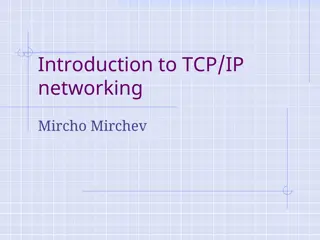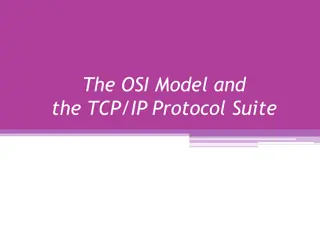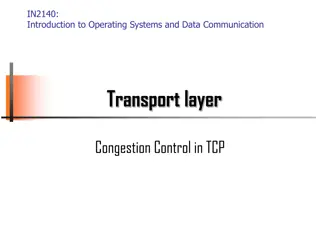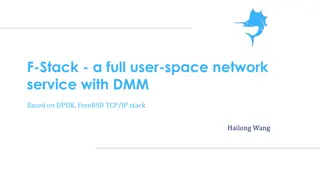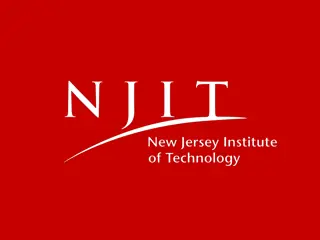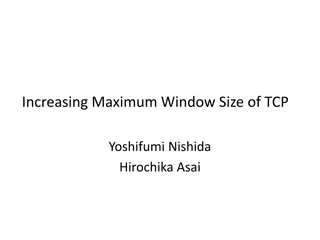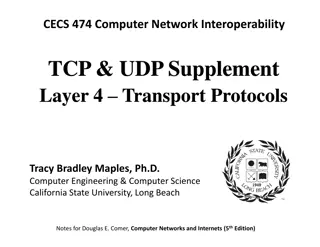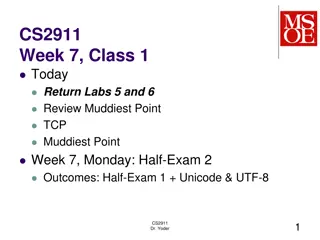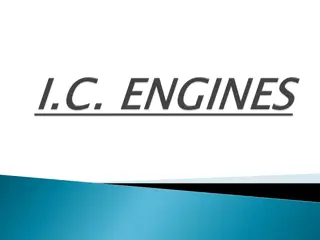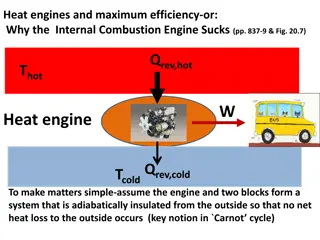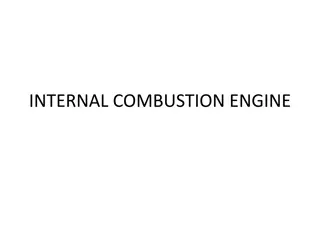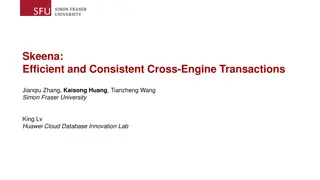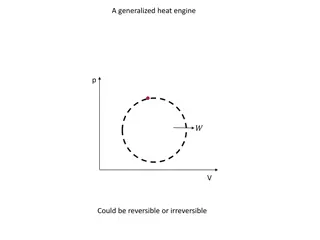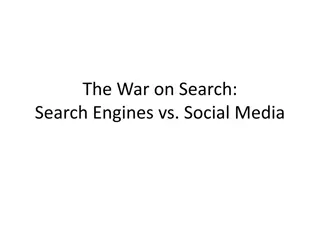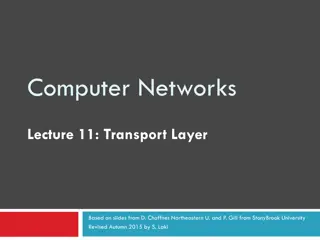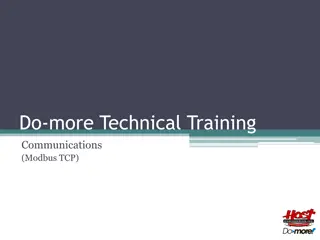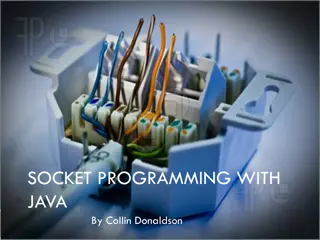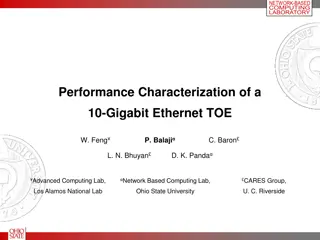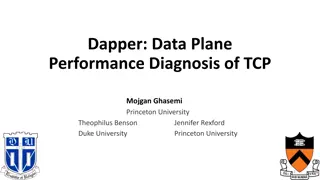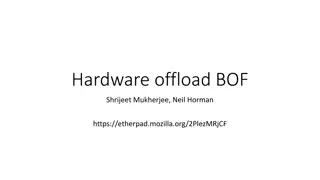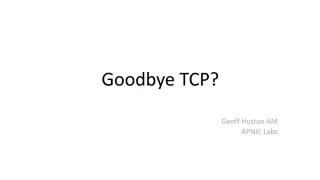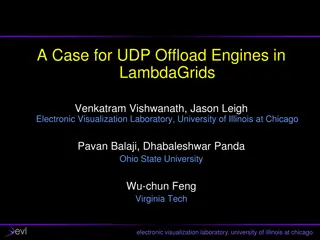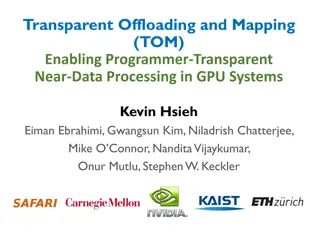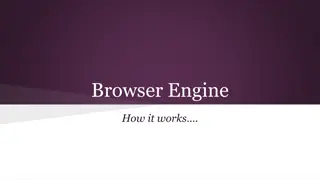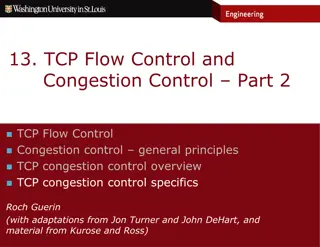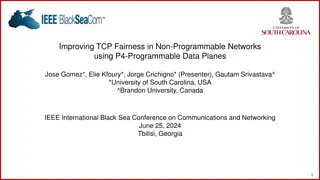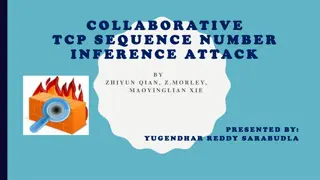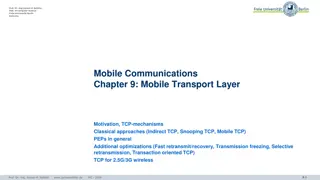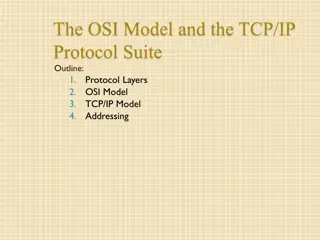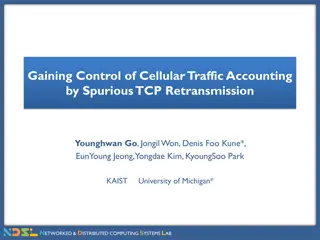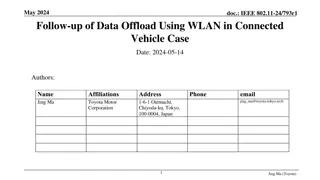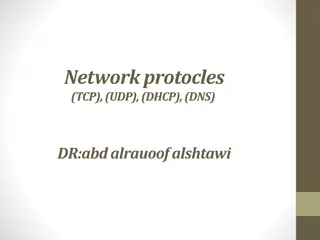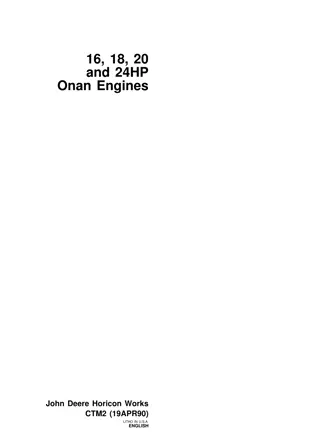TIBCO TCP-TM Exam Overview & TCP BusinessEvents Exam Questions
Start here---https:\/\/bit.ly\/42Mp9mW---Get complete detail on TCP-TM exam guide to crack Professional. You can collect all information on TCP-TM tutorial, practice test, books, study material, exam questions, and syllabus. Firm your knowledge on Professional and get ready to crack TCP-TM certifica
7 views • 14 slides
TIBCO TCP-BE Exam Success: Key Concepts and Practice Sessions
Begin your journey here---https:\/\/bit.ly\/3UUOF7y---Discover comprehensive details on the TCP-BE exam guide to excel as a Professional. Gather all the essential information on TCP-BE tutorials, practice tests, books, study materials, exam questions, and syllabus. Strengthen your expertise in Profe
3 views • 14 slides
Buy Some words about Marcos Engines Online
Welcome to Marcos Engines, Your Premier Buy macro engines online, German Dealer of Car Engines, Marine Engines such as outboard motors and Inboard Motors, Marine Generators, Standby Generators, Welders, Motorcycles Engines, Car Transmissions, and Pumps! If you\u2019re looking for high-quality car en
6 views • 3 slides
Internal Combustion Engines: A Comprehensive Overview
Explore the intricate world of Internal Combustion Engines (I.C. Engine), including their classification, components, terminology, and operation cycles. Delve into the various types, arrangements, and applications of I.C. engines, from automobiles to aircraft engines, and uncover the key principles
1 views • 25 slides
TCP/IP Networking Fundamentals
Explore the basics of TCP/IP networking, including protocols like IP, UDP, RTP, and more. Learn about the structure of the Internet, the role of routers, OSI network model, TCP/IP network model, and packet encapsulation in data transmission. Gain insights into the layers of the OSI model and the TCP
2 views • 36 slides
OSI Model and TCP/IP Protocol Suite
Explore the concept of layering in data communication, comparing the OSI model and TCP/IP protocol suite. Learn about protocol layers, protocol hierarchies, and the functionality of each layer in these models. Discover the interrelationships between layers and the evolution from OSI to TCP/IP.
6 views • 57 slides
TCP Congestion Control in Operating Systems
TCP congestion control is crucial for maintaining stability and efficient data transmission in computer networks. This article delves into the history and development of congestion control algorithms, highlighting key components such as additive-increase, multiplicative-decrease, and slow-start reac
0 views • 12 slides
Mobile Computing and TCP/IP Protocol Suite
Mobile computing is crucial for continuous internet connectivity regardless of physical location. The TCP/IP protocol suite, consisting of Transmission Control Protocol (TCP) and Internet Protocol (IP), forms the backbone of internet infrastructure. IP addressing and mobility challenges are addresse
2 views • 51 slides
Optimizing User-Space Network Services with F-Stack and FreeBSD TCP/IP Stack
F-Stack, a user-space network service using DPDK and FreeBSD TCP/IP stack, addresses challenges in handling service traffic like CDN and live streaming. By leveraging 25GbE, 40GbE, and 100GbE NICs, coupled with multi-core CPUs and kernel bypass techniques, F-Stack overcomes bottlenecks between user
2 views • 17 slides
OSI Model and TCP/IP Protocol Suite in Computer Networking
This chapter explores the OSI model and TCP/IP protocol suite, delving into protocol layers, addressing mechanisms, and network components. It highlights the interface between layers, functions of each layer in the OSI model, and compares TCP/IP protocol suite layers with OSI model layers. The discu
0 views • 30 slides
TCP Manager Module Orientation Overview
The TCP Manager Module Orientation provides an in-depth look at the TimeClock Plus (TCP) system, including employee setup, time tracking, leave requests, and clocking rules. The system allows for seamless management of staff time and schedules, with features such as automatic time adjustments, accru
0 views • 14 slides
Enhancing TCP Performance: Understanding Maximum Window Size
Explore the concept of increasing the maximum window size of TCP to improve performance. Delve into discussions on the current limitations, proposals for enhancement, and the importance of understanding TCP sequencing. Discover insights on why the maximum window size must be less than 2^30 and wheth
1 views • 8 slides
TCP and UDP in Computer Network Interoperability
The Transport Layer in computer networks facilitates logical communication between application processes on different hosts. Two key transport protocols, UDP and TCP, provide distinct services - UDP offers unreliable and unordered delivery, while TCP ensures reliable and ordered delivery with featur
2 views • 9 slides
Regulations on 1,2,3-Trichloropropane (1,2,3-TCP) Contaminant Levels
State Water Board conducted a public hearing regarding the regulations on 1,2,3-TCP, a carcinogenic chemical found in groundwater. The proposed regulations aim to set Maximum Contaminant Levels (MCL) and other safety measures to protect public health. Stakeholder meetings and public workshops were h
4 views • 21 slides
TCP Protocol and Reliability in Networking
This content covers key concepts related to the TCP protocol in networking, including TCP header fields, sequence and acknowledgement numbers, the 3-way handshake, and reliability mechanisms such as error detection, feedback, and retransmission. It also discusses potential issues in TCP communicatio
8 views • 41 slides
Overview of Internal Combustion Engines and Their Components
Internal combustion engines are devices that convert fuel's chemical energy into thermal energy, which is then used to produce mechanical work. The engines can be classified into two types - External Combustion Engines and Internal Combustion Engines. Internal combustion engines include components l
2 views • 53 slides
Heat Engines and Engine Efficiency
Exploring the concept of heat engines and maximizing efficiency, specifically examining why internal combustion engines have limitations. The discussion covers reversible heat transfer, engine work, efficiency calculations, and practical application to car engines. Insights on temperature differenti
1 views • 4 slides
The Components and Operation of Internal Combustion Engines
Dive into the world of internal combustion engines through a detailed exploration of their classification, key components like cylinders, pistons, crankshafts, and crankcases, as well as the operational principles of four-stroke engines. Discover how these engines work, their construction, and the r
2 views • 103 slides
Efficient Cross-Engine Transactions in Skeena
Skeena presents efficient and consistent cross-engine transactions, offering solutions to challenges faced by traditional database engines. By utilizing memory-optimized database engines and a multi-engine DBMS approach, Skeena addresses issues such as high costs and compatibility concerns associate
2 views • 21 slides
Generalized Heat Engines and Carnot Cycle
Generalized heat engines can be reversible or irreversible, with Carnot engines playing a crucial role in maximizing efficiency. By analyzing the heat absorption and rejection processes, we explore the impact of multiple tiny Carnot engines working together and the overall effect on the main general
0 views • 14 slides
The Battle Between Search Engines and Social Media
In the ongoing debate of Search Engines vs. Social Media, the focus is on visibility for businesses and products. While search engines excel in catering to our search habits and providing accurate results, social media offers peer recommendations, real-time responses to criticism, and immediate avai
0 views • 7 slides
TCP: Evolution, Features, and Operation
The lecture covers the Transport Layer focusing on Transmission Control Protocol (TCP). It discusses TCP's reliability, bi-directional byte streams, congestion control, flow control, connection setup, three-way handshake, connection tear-down, sequence number space, and bidirectional communication.
1 views • 48 slides
Communication Setup for Modbus TCP in Do-more Technical Training
Explore the configuration and setup of Modbus TCP communication in Do-more devices, including the use of built-in Ethernet ports and ECOM100 modules for both server and client roles. Understand the parameters, limitations, and expandable ranges for communication with Modbus TCP devices as slaves and
0 views • 28 slides
Socket Programming in Java
Exploring the essentials of socket programming with Java, covering topics such as network sockets, socket lifecycle, communication protocols (UDP and TCP), and considerations for client/server applications using UDP and TCP. TCP is highlighted as suitable for services like remote login and file tran
2 views • 18 slides
Performance Characterization of a 10-Gigabit Ethernet TOE
The Network Based Computing Laboratory at Ohio State University and Los Alamos National Lab conducted a study on the performance of a 10-Gigabit Ethernet TCP Offload Engine (TOE). The research highlights the advancements and technology trends in Ethernet infrastructure, focusing on achieving higher
1 views • 21 slides
TCP Data Plane Performance Diagnosis Research
Researchers from Princeton University and Duke University delve into diagnosing performance issues in TCP data planes within public clouds. They address challenges related to monitoring, identifying poor TCP performance sources, and diagnosing problems at the edge, proposing solutions for efficient
1 views • 20 slides
Hardware Offload BoF Discussion at Netdev01
Discussion at the Hardware Offload BoF session during Netdev01 focused on preserving the Linux networking model, exchanging ideas on capability determination, and addressing challenges in emulating hardware devices in switch models. Participants explored topics such as managing devices in a generic
0 views • 5 slides
The Evolution of TCP and Internet Traffic Trends
The Internet landscape has seen significant changes with over 90% of traffic using encrypted payloads, a majority originating from cloud servers, and a notable shift towards QUIC protocol. The role of TCP as a reliable transport protocol is explored, highlighting its adaptive streaming capabilities
1 views • 38 slides
Optimizing Real-Time Data Delivery with UDP Offload Engines in LambdaGrids
Real-time interactive scientific visualization and high-definition video conferencing in large-scale visualization environments like LambdaGrids require high-throughput, low latency, and low jitter data delivery. This article discusses the motivation behind using UDP-based transport protocols and th
0 views • 12 slides
TOM: Enabling Programmer-Transparent Near-Data Processing in GPU Systems
This paper discusses Transparent Offloading and Mapping (TOM) for enabling programmer-transparent near-data processing in GPU systems. It addresses the opportunity of processing data directly in 3D-stacked memories, the challenges involved, and introduces a new mechanism for identifying and deciding
0 views • 12 slides
How Browser Engines Work
Browser engines play a crucial role in how web browsers retrieve, present, and traverse information resources on the World Wide Web. This process involves fetching a page, interpreting URLs, rendering content with layout engines, and utilizing components like the host application. Popular layout eng
0 views • 10 slides
TCP Flow Control and Congestion Control Variants
The text delves into TCP flow control and congestion control mechanisms, focusing on TCP Tahoe and Reno variants. It explains the sender-side congestion control algorithms, such as AIMD, slow start, and fast recovery. Details of TCP variants like BIC and CUBIC are also discussed, highlighting their
2 views • 29 slides
Enhancing TCP Fairness Using P4-Programmable Data Planes
This study presents a solution to improve TCP fairness in non-programmable networks by utilizing P4-programmable data planes. It addresses unfair bandwidth distribution issues in TCP traffic and proposes a system that leverages P4 switches for passive traffic monitoring and RTT computation.
0 views • 24 slides
TCP Sequence Numbers and Attacks
Explore the fundamental concepts of TCP sequence numbers and inference attacks, along with the design, implementation, and impact analysis of TCP attacks. Delve into the significance of TCP fields, the three-way handshake process, as well as sequence and acknowledgment numbers to gain a comprehensiv
1 views • 35 slides
Mobile Transport Layer and TCP Mechanisms
Mobile communications require efficient transport protocols like TCP for reliable data transmission in wireless and mobile networks. This involves addressing challenges such as packet loss, network congestion, and performance degradation. Key topics include TCP mechanisms, congestion control, and op
2 views • 15 slides
OSI Model and TCP/IP Protocol Suite in Computer Networking
This content delves into the OSI model and TCP/IP protocol suite, highlighting the protocol layers, addressing mechanisms, and communication scenarios. It explores the functions of each layer, the interface between layers, and compares the TCP/IP layers with the OSI model. Through examples and illus
0 views • 46 slides
Cellular Traffic Accounting and TCP Retransmissions
Delve into the complexities of cellular traffic accounting, focusing on the impact of TCP retransmissions on network data billing. Explore the challenges faced by cellular providers in accurately charging subscribers for data usage amidst increasing traffic volumes. Consider the implications of TCP
1 views • 31 slides
Enhancing Data Offload Using WLAN for Connected Vehicles
Discussing the importance of data offload using WLAN in connected vehicles, highlighting the gap between current IEEE standards and the requirements for efficient data transfer. Emphasizing the need for fast association, seamless handover, and optimized algorithms for connected vehicle cases, with e
0 views • 11 slides
Network Protocols: TCP, UDP, DHCP, DNS
Explore the fundamentals of key network protocols including TCP, UDP, DHCP, and DNS. Learn about IPv4 and IPv6 addresses, IP address classes, and the roles of these protocols in the TCP/IP suite. Understand the differences between TCP and UDP in terms of connection setup and reliability. Discover th
1 views • 13 slides
John Deere Engines Onan 16 18 20 24 HP Engines Service Repair Manual Instant Download
John Deere Engines Onan 16 18 20 24 HP Engines Service Repair Manual Instant Download
0 views • 22 slides

